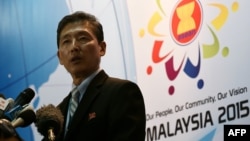North Korea's Foreign Ministry spokesman defended the country’s nuclear program Thursday, saying Pyongyang’s decision on whether it would carry out another nuclear test would depend on the United States.
"It depends on the attitude of the United States, and the U.S. is having an increased level of military provocation in front of the door of DPRK,” spokesman Ri Tong Il said in Kuala Lumpur.
The spokesman was summarizing a statement made by North Korean Foreign Minister Ri Su Yong earlier in the day at the ASEAN Regional Forum in the Malaysian capital, an annual security conference organized by the Association of Southeast Asian Nations.
Speaking to reporters on the sidelines of the conference, the Foreign Ministry spokesman reiterated his country’s offer to suspend its nuclear program if the United States stops conducting joint military exercises with South Korea.
“If the U.S. makes a bold policy change to suspend large-scale provocative, aggressive, joint military exercises, all the issues including the concerns of the U.S. and the region will stand a chance of opportunity,” he said.
Six-party talks
Also attending the meetings in Malaysia were foreign ministers from South Korea, the U.S., China, Japan and Russia — the nations that were involved in international talks with North Korea to end its nuclear program in exchange for lifting sanctions and providing assistance. In 2009, Pyongyang walked away from these talks.
The North Korean spokesman also strongly condemned the U.S. as a hostile and provocative military force in the region, intent on regime change.
“What the U.S. really wants is not denuclearization of the Korean Peninsula but the Americanization on the entire Korean Peninsula,” he said.
His country’s nuclear weapons program, the spokesman said, is a needed deterrent to the U.S. nuclear force and its presence on the Korean border.
The North Korean spokesman also defended his country’s space program, which he said is for exploration and economic development. The U.S. and its allies say the program is intended to develop long-range ballistic missile capability.
He also accused the U.S. of waging economic war with sanctions that target not only the country’s nuclear and military capabilities but also its civilian economic activities.
Human rights record
North Korea’s government has long faced international condemnation for having one of the world’s worst human rights records. Last year, the United Nations issued a landmark report that likened Pyongyang’s record of abuse to that of Nazi Germany.
The North Korean spokesman Thursday called the U.N. report a fabrication.
In January, Pyongyang made the same offer to suspend its nuclear program for an end to joint military drills in the South but also demanded that Seoul stop activists in the South from sending balloons full of anti-regime rhetoric and information into the North.
Washington at that time said it would not make a concession to Pyongyang for doing what it is already obligated to do through past nuclear agreements and U.N. restrictions in place.
U.S. officials have said they are willing to conduct informal talks with North Korea without conditions, but Pyongyang must first suspend its nuclear program before formal negotiations can again take place.





